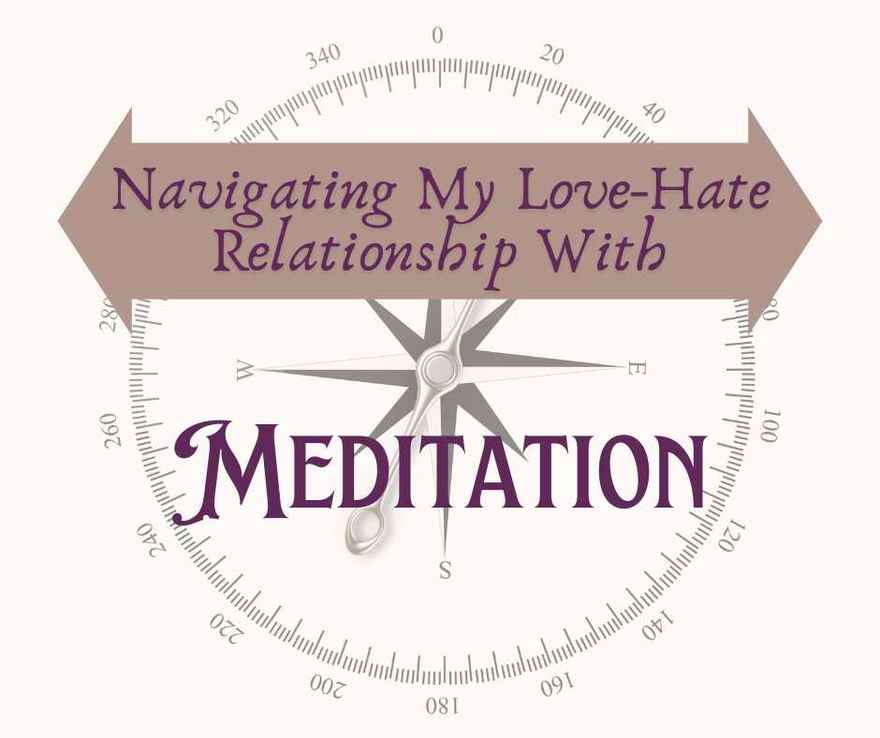Navigating My Love-Hate Relationship with Meditation

I have to come clean. I have a love-hate relationship with meditation.
If you have followed my blog, you might have noticed that I often write about meditation. Even if the article isn't about meditation directly, meditation is usually one of the "cures" for whatever is causing discomfort in your life.
I'm sure I give the impression that I am a Zen meditation guru who spends at least an hour every day in quiet meditation with a smile on my face.
Nothing could be further from the truth!
My meditation practice is very inconsistent. I can go weeks without meditating at all. Some days, I struggle to sit for five minutes in meditation.
I'm sure many of you feel the same way. Some of you may have resisted starting a meditation practice because it feels too hard or you don't think you can do it right.
I hope by the end of this article, I will have convinced you to start a meditation practice, even if you hate meditation!
My Love for Meditation
There are many reasons why meditation is good for you, and I'm sure you know most of them.
From the physical aspect of lowering blood pressure to the mental benefits of acceptance and letting go.
When I consistently meditate, I notice that my life flows smoothly. I am less upset by past thoughts or future worries.
I take better care of myself in other areas, such as exercising and eating healthier.
So why do I resist meditation? The million-dollar question!
My Hate for Meditation
Hate is perhaps too strong for my negative feelings towards meditation.
Meditation is one of the self-care activities I would prefer to avoid, along with exercising, giving up sugar, and decluttering.
It's one more thing to feel guilty about not doing.
There are plenty of reasons to resist mediation.
- It's uncomfortable both physically and mentally. Sitting still in whichever position you prefer for ten minutes or longer can be uncomfortable. My nose itches, my legs twitch, and thoughts come rushing in. I would like to mind-numbingly scroll social media rather than deal with my thoughts and emotions!
- Change is hard. Every new habit comes with a struggle to keep going long enough to see results.
- It can feel like a time suck. Being still for as little as five minutes can be excruciating if I have a busy day planned. However, those are the days I need meditation the most!
- I have Imposter Syndrome. I'm not a soft-voiced Zen person who has my life together. Sometimes, I feel "fake," like I'm pretending to be something I'm not when I meditate. This is silly, as meditation is for everyone and a skill anyone can master.
The Biggest Reason
The biggest reason I struggled with meditation in the beginning was I didn't understand how it worked.
When I started meditating 25 years ago, I was going through a tough time with anxiety.
I was looking for peace, for my thoughts to slow down and my anxiety to disappear.
That is not how meditation works!
Your thoughts do not stop, and your emotions don't disappear. Meditation teaches you detachment and acceptance of whatever comes up.
It is the acceptance that brings peace.
Navigating the Internal Struggle
So, how do I balance my love and hate for meditation?
I said earlier that I have an inconsistent meditation practice. Upon reflection, I should say I have an inconsistent "formal" meditation practice.
I use mindfulness techniques daily.
A formal practice is setting aside five minutes or more specifically to meditate.
During that time, I will either use a guided meditation from the Mindfulness app or sit quietly using my breath or a sound to stay focused. If I'm not using a guided meditation, I set a timer on my phone.
My less formal practice consists of reminding myself to be present during my day, such as turning off my phone and the TV while I eat.
I'm always multitasking! I listen to music or podcasts when I walk, scroll on my phone while "watching" TV, and read while riding in a car.
One of my best skills is turning off the world around me!
As a form of informal meditation, when I catch myself "tuning out" for an extended period, I will put down my phone or book and concentrate on being fully present for a few minutes.
Reminding myself to break away from my multi-tasking to be present even for a few minutes during my day pays big dividends.
Embracing the Journey
Being honest with myself about my love-hate relationship with meditation has allowed me to embrace the journey.
I no longer beat myself up when I realize it's been a while since I meditated. I accept what is, and I start again.
Even in a period without daily practice, the lessons learned from meditation are always with me.
Such as:
- Catching negative self-talk
- Accepting things as they are
- Letting go of expectations
- Awareness of ever-changing emotions
- Being more present in my life
I became aware that the times in my life when I had the most discomfort were when I fought to change something I was uncomfortable with.
The discomfort faded when I learned to let go of the battle and accept life as it is.
In my experience, the most significant advantage of a meditation practice is learning acceptance and allowing everything to be as it is without assigning a label (good, bad, etc.).
Your Journey
Creating a consistent meditation practice can be challenging, like any new habit.
However, the steps are the same as when starting any new habit: start small and stay consistent.
Consistency is always a challenge, but many tools can help.
- As mentioned above, using an app like Mindfulness can be beneficial. The app sends you reminders, and it has programs you can follow based on your experience level.
- YouTube also has excellent meditation videos you can use. Try a few until you find someone or a style that resonates with you.
- Try guided meditations or recorded sounds like rain, chanting, or chimes.
- Set a timer on your phone and tune into your breathing.
- Set reminders on your phone to practice being present during your day.
In Conclusion
“Mindfulness meditation doesn’t change life. Life remains as fragile and unpredictable as ever. Meditation changes the heart’s capacity to accept life as it is.” – Sylvia Boorstein


0 comments
Leave a comment
Please log in or register to post a comment